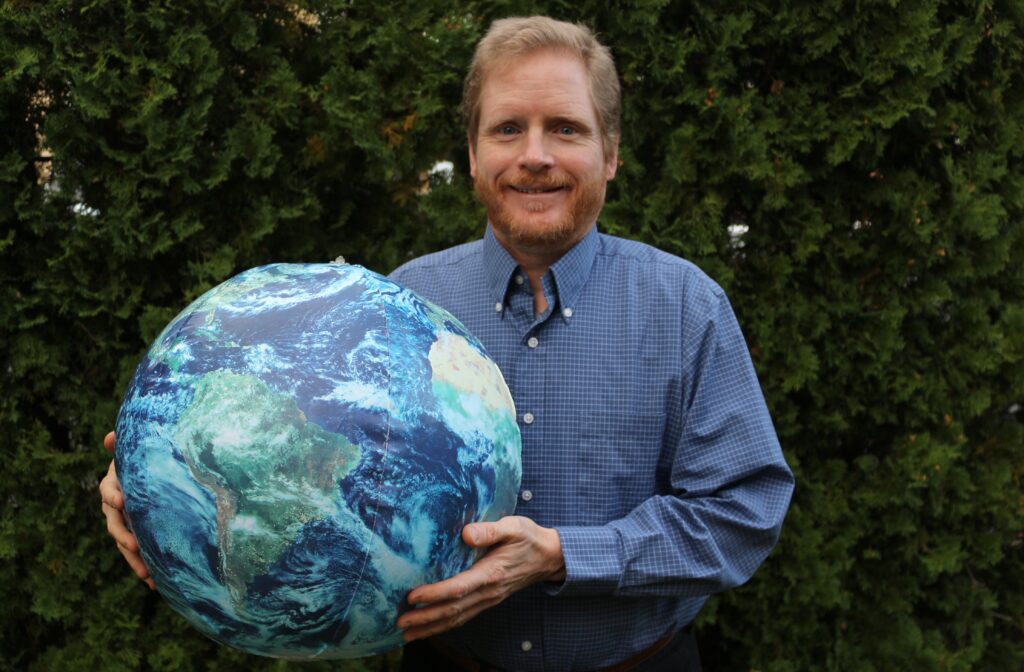
“Remember that your political adversaries want you to feel demoralized, cynical, and hopeless about taking political action. NEVER GIVE THEM THAT SATISFACTION.”
– Brian Ettling
This is the toughest blog for me to write. In fact, I devoted all of 2023 to writing and blogging about my life story. I knew it was vital for me to write this blog, but I dreaded writing it. For the past 23 years, I have felt that environmentalists, climate advocates, progressives and Democratic leaning voters were not smart about electing Presidential, state level, and local candidates who would protect our environment, planet, and our democracy.
This is a very painful blog to write, but I feel like I must share but to share my story. Hopefully, someone can learn from my disappointment and letdown I felt from environmental and climate Democratic voters who allowed awful candidates for President and other elected offices win.
This was such a tough blog to write. I had so much to say that I broke up it into many parts:
Part 1, My 1980s childhood in Missouri to witnessing 2000 Presidential Election in Florida
Part 2, my story from 2001 to 2007
Part 3, 2007-08, Loss of a friend, Leaving Everglades, and finding my passion for climate action
Part 4, Healing from grief and Taking Climate Action in Oregon and Missouri 2009-2016
Part 5: My frustration and heartbreak with the 2016 Presidential Election
Part 6: Donald Trump’s Disgraceful Presidency and my focus on climate action 2017-2020
Taking Climate actions in St. Louis in January 2017
In January 2017, as Donald Trump prepared to become President, I was busy taking climate action. On January 4th, I gave a speech at St. Louis South County Toastmasters, where I was a member. My talk advocated for joining Toastmasters as one of the best ways I know to engage climate change doubters. A video of this speech is on YouTube. My fellow Toastmasters voted for me as “Best Speaker” for this speech. This was my 20th speech for Toastmasters during the previous 6 years. Most of my speeches were about climate change. As a result of this speech, I achieved the Advanced Communicator Bronze Award from Toastmasters International.
On Sunday morning, January 8th, I was the first speaker for the “Climate Change and You” series at Second Presbyterian Church in St. Louis. I led a webinar for Citizens’ Climate Lobby (CCL) volunteers on January 12th, “National Parks and Climate Change.” I talked about how my work experience as a park ranger and our love of national parks helped me achieve common ground in meetings with Congressional staff when I lobby them as a private citizen on climate change.
On January 24th, friends informed me on Facebook that they spotted me on TV when my August 2016 episode on Comedy Central’s Tosh.o aired on television again. One of my favorite stories that happened when this episode aired was shared my friend, Lucia Whalen, who is a professional comedian. I know Lucia as a fellow Climate Reality Leader. She was hanging with friends and watching television. She was trying to convince them to attend the upcoming 2017 Climate Reality Training in Denver, Colorado and my episode came on TV.
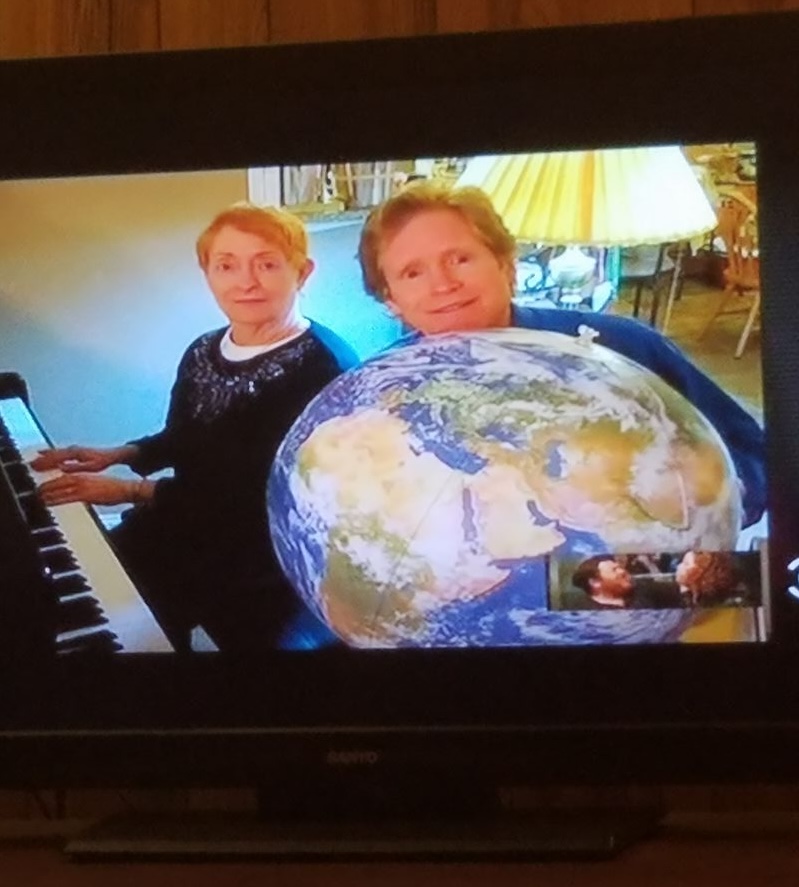
On January 29th, I organized a St. Louis Climate Reality Meet Up (now called Climate Meetup-St. Louis) event at Schlafly’s Bottleworks. I invited Philadelphia area businessman and CCL volunteer Congressional Liaison Jay Butera as a guest speaker via Zoom. I asked Jay to share his recent lobby stories to successfully shift some GOP members of Congress to act on climate change. Just one month before, the National Geographic TV series, Years of Living Dangerously, featured Jay on an episode, called “Safe Passage.” Jay asked me to play this video segment at this event before I introduced him to speak. Over 80 people attended this January event at Schlafly’s, which packed their large meeting room.
This was my last event I organized for this group. Just days before this event, my wife Tanya, accepted a job in Portland, Oregon. We moved there in the second week of February 2017.
The start of Donald Trump’s Presidency in 2017 was a disgrace and a disaster.
As Tanya and I transitioned to living in Portland, the U.S.A. was transitioning to life under the Presidency of Donald Trump. His Presidency did not start well. He was unhappy with the news media reporting of the small crowd size at his Inauguration. Two days later, his Inauguration was overshadowed by the Women’s March, the largest peaceful protest in U.S history, according to political scientists. It was prompted by Trump’s policy positions and rhetoric, which were considered misogynistic and represented a threat to women’s rights. Trump tried to impose a ban on Muslim immigrants to the U.S. which sparked big nationwide protests at airports.
Trump’s leadership was an ongoing disaster. The abrupt firing of FBI Director James Comey in May 2017. His continual lying because he did not want to acknowledge the Russian interference in the 2016 election. Trump refused to accept Russian mingling in the 2016 election, although it was obvious they played a role in promoting misinformation on social media and hacking Hillary Clinton’s emails. Trump campaign had numerous meetings with the Russians in 2016 and shared campaign data with them.
In June 2017, I felt dismayed, as a climate organizer when Trump withdrew from the 2015 international Paris Climate Agreement. He promised he would do this when he ran for President. Thus, his action was no surprise, but it looked foolish with the rising threat of climate change.
On August 12, 2017, it felt like American racism and bigotry had fully bubbled up to the surface with the “Unite the Right Rally” in Charlottesville, Virginia. White nationalists and neo-Nazis showed up the evening before to protest the planned removal of the prominent statue of Confederate General Robert E. Lee. They repeated racist chants, such as “Jews will not replace us!” which needed to be condemned in the strongest possible terms. It seems like the election of Donald Trump allowed some Americans to think that it was ok to say openly racist things and boldly gather with like-minded people to openly express hatred.
When counter-protestors showed up in Charlottesville to stand up to the alt-right protesters, violence broke out among them. The violence peaked when a car plowed through a group of counter-protesters killing one protester, Heather Heyer, and injuring more than 19 others.
The worse part was that Donald Trump struggled to find the right words to condemn the bigotry, hatred, and violence. He tried to rebuke the neo-Nazis and alt Right. However, he then made the erroneous statement, “you also had people that were very fine people on both sides.”
Oddly, two of my Facebook friends defended maintaining the Confederate statues in the U.S, such as the Robert E. Lee statue in Charlottesville, VA. From my perspective, America was going backwards under Donald Trump. Elections have consequences. The Democratic leaning voters in 2016 who chose not to vote or voted for third party candidates helped elect Donald Trump.
Donald Trump’s awful first year showed Hillary Clinton should have been elected President.
In September 2017, Hillary Clinton wrote a book that was published and released that month called, What Happened, where she attempted to grapple with the outcome of the 2016 election. The book received mixed reviews as she shared her perspective. Some critics thought she was still “out of touch” with Americans, “not newsy.” On the other hand, I agreed with her from what she wrote in the book that Bernie’s “attacks caused lasting damage, making it harder to unify progressives in the general election and paving the way for Trump’s ‘Crooked Hillary’ campaign.”
I saw this with some of my progressive friends in November 2016 who reluctantly voted for Hillary Clinton or voted for third party candidates such as Jill Stein of the Green Party. Did Bernie Sanders play a role in handing the 2016 Presidential election to Donald Trump? Most news sources I read from November 2016 and afterwards did not think that. However, I found one source, “Bernie Sanders Voters Helped Trump Win and Here’s Proof” from Newsweek, August 23, 2017.
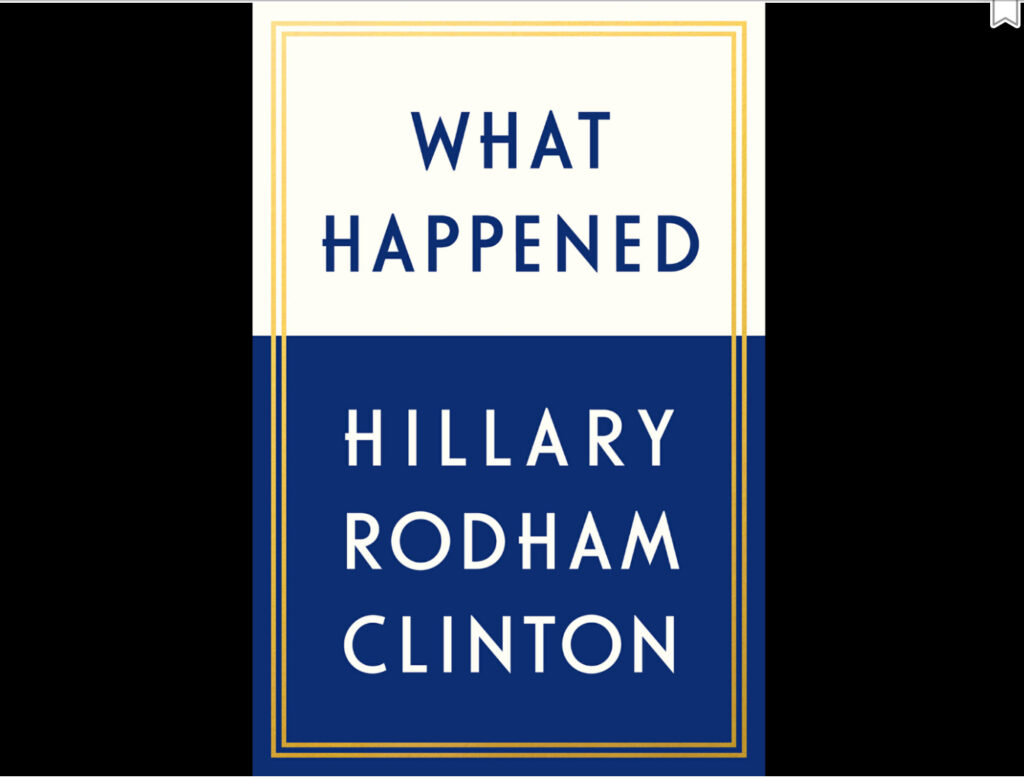
In that 2017 book, Hillary Clinton pointed to many factors that led to her defeat, including the Russian misinformation campaign on the internet, FBI Director James Comey re-opening the email investigation against her, the media obsession over her emails, many people distrusted her especially as the first woman running for President, Republican voter suppression efforts in states like Wisconsin, and ultimately the decisions she made as the candidate. She aimed to be as candid as she could be and let her ‘guard down’ by writing this book.
When I read What Happened in October 2017 and re-read it in November 2023, I came away thinking that Hillary Clinton would have made an effective President. She had well thought out plans for a jobs and infrastructure package, comprehensive immigration reform with a path to citizenship, bipartisan criminal justice reform, bringing down prescription drug prices, and a public option to get us closer to affordable, universal healthcare.
As she prepared to run for President in 2015, Hillary sought out the advice of Senator Elizabeth Warren on tackling issues such as student debt and financial reform. After Hillary won the Democratic nomination, she collaborated with her former Democratic opponent in the race, Senator Bernie Sanders, on plans to make college more affordable and “to write the most progressive Democratic platform in memory.”
She noted that her collaboration with Bernie on college affordability, “That kind of compromise is essential in politics if you want to get anything done.”
Even more, she had a chapter in the book on her philosophy how one makes real change in America: “Step by step, year by year, sometimes even door by door. You need to stir up public opinion and put pressure on political leaders. You have to shift policies and resources. And you need to win elections. You need to change hearts and change laws.”
She learned from her battle for health care reform in the early nineties, “Reluctance to compromise can bring defeat…If you want to get something done, you have to find a way to get to yes.”
She advises that “Progress comes from rolling up your sleeves and getting to work.”
A final tip I wanted to share from her: “I’ve always thought about policy in a very practical way. It’s how we solve problems and make life better for people. I try to learn as much as I can about the challenges people face and they work with the smartest experts I can find to come up with solutions that are achievable, affordable, and will actually make a measurable difference.”
Like Al Gore sixteen years earlier, Hillary Clinton was a very thoughtful highly qualified candidate for President who lost, I believe, because not enough Democratic leaning voters showed up to support and vote for her. In her book What Happened, I did not get the impression that Hillary wrote it to rehash the past. Rather, it felt more like a catharsis to heal from that bitter defeat and a lesson for us and future historians to understand her perspective on her 2016 election loss. At the same time, Hillary made it clear that she was moving forward with her life and doing what she could continuing to make a difference for the U.S. In the months after her defeat and Trump’s inauguration in 2017, her mantra was, “Resist, insist, persist, enlist.”
My climate change public speaking in 2017 and 2018 after moving to Portland Oregon
Like Hillary, I was not giving up after Donald Trump became President in 2017. After Tanya and I moved to Portland, Oregon in February 2017, my climate organizing was very busy that year. In early March, I was a breakout speaker at the Day of Action after the final day of the Climate Reality Training in Denver, Colorado in early March 2017. On March 13th, a Portland 6th grade teacher invited me to be a speaker at the Climate Conference that she hosted.
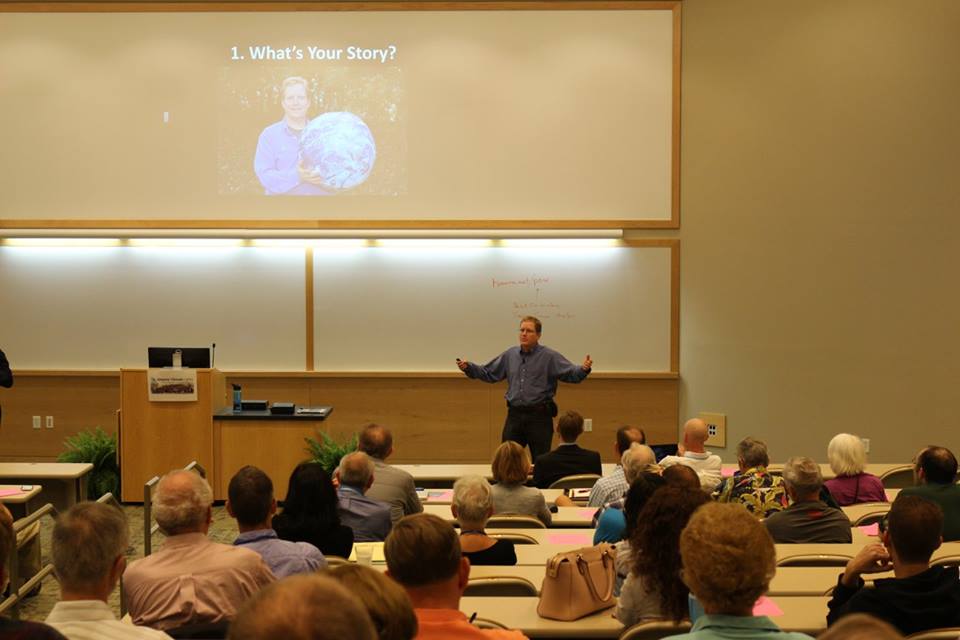
At the end of March 2017, I traveled back to Missouri for a week to give climate change talks to over 100 people in Jefferson City and over 60 people Truman State University in Kirksville. I worked at Crater Lake National Park as a park ranger from early May to the end of September 2017. However, I took off the month of June to attend the Citizens’ Climate Lobby (CCL) Conference in Washington D.C, where I was a breakout speaker and moderated a panel discussion. At the end of June, I attended the Climate Reality Training in Bellevue, Washington, where I was a co-breakout speaker for the conference giving a presentation on “Reaching Your Audience: Tips and Techniques from Experienced Climate Reality Leaders.”
At the end of October and beginning of November 2017, I lead a climate change CCL speaking tour across eastern, central, and southern Oregon. It was called The Oregon Stewardship Tour. For a recap, I had:
- 9 public outreach events
- 2 lobby meetings with district offices of Rep. Greg Walden
- 2 newspaper editorial board meetings
- 2 live radio interviews
- 4 published articles in Oregon newspapers featuring the tour.
After I completed that tour, the Portland Climate Reality Chapter wanted me to give a presentation about that tour for their December 2017 meeting. In that same month while visiting my parents and Tanya’s parents in St. Louis, MO, KMOX 1120 AM radio station, the most dominating radio station in the St. Louis area, invited me to the station to record a one-hour radio interview about my climate organizing.
In January 2018, I was invited to give a short climate change talk at the coastal town of Newport, Oregon. February 2018, I was a guest speaker at the Florida CCL Regional Conference in Tampa, Florida. My topic was the power of Storytelling for communicating climate change. In March 2018, the coordinator for the Greater Pacific Northwest CCL Regional Conference invited me to give two talks at this conference in Boise, Idaho. I gave a summary of my October CCL tour across eastern, central, and southern Oregon. My other talk was on the importance of storytelling for effective climate action. Both of those Boise, Idaho talks were recorded for YouTube.
From February to June 2018, I worked for Tesla Energy. My job was to engage customers at local Home Depots in Portland to schedule them to meet with Tesla solar advisors at their home to install solar panels. This was my first sales job. I became good at making sales for home solar installations. Unfortunately, Tesla laid off my supervisor and the middle management at Tesla Energy in mid-June 2018. My job was transferred to Tesla Motors. I went from a job where I set my own hours and worked near home to transferred to a new Tesla job where I had a long commute and worked long hours. The new job was not a good fit for me, so I quit in early July 2018 to focus on my climate organizing.
Discovering statistics that “Environmentalists are disproportionately awful voters.”
In early June 2018, I attended the CCL Conference and Lobby Day in Washington D.C. The first speaker at their conference and for the June monthly call was Nathanial Stinnett, Executive Director of the Environmental Voter Project.
His presentation was earth shattering for me. Stinnett showed a graph (pictured below) which clearly explained why members of Congress have made climate action a very low priority up to now. When American likely voters are polled about their top concerns, climate change and the environment appeared at the bottom of the list compared to top concerns such as national security & terrorism, economy & jobs, immigration, health care, crime & public safety, etc.
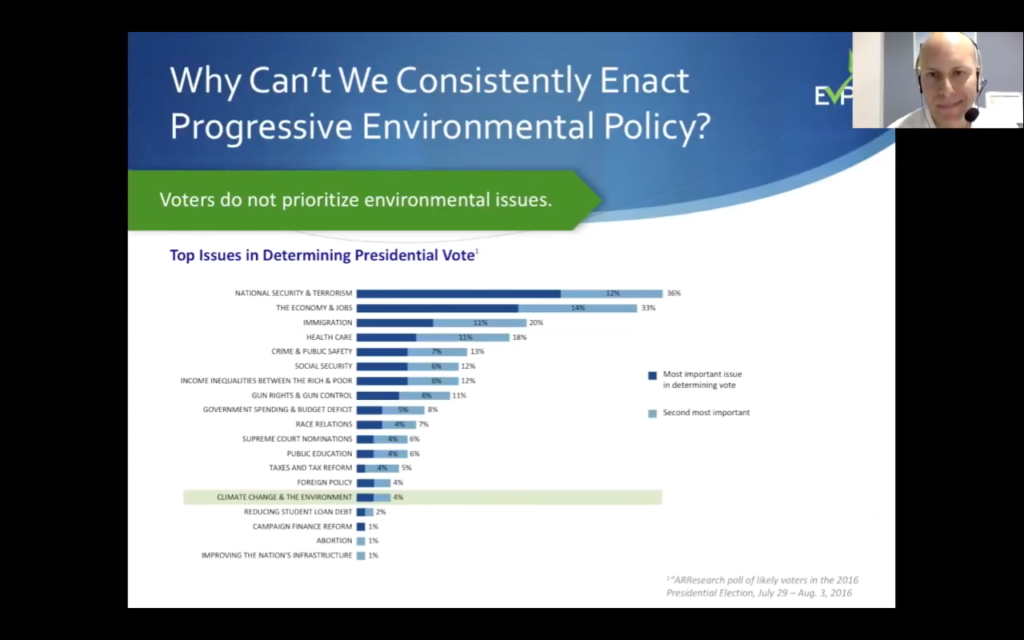
According to Stinnett: “It is really important to understand is that when so few voters prioritize climate change. It impacts policy making on all sides of the political spectrum. Democrats or Republicans are not going to pay attention to an issue that voters don’t care about.”
Looking at the graph, he pointed out that the loudest voices are those of voters because “politicians go where the votes are, or they don’t get to be politicians anymore.”
Stinnett then boiled it down to good news and bad news. As of 2018, the good news was that 20.1 million Americans are registered to vote identify climate change or other environmental issues as one of their top two priorities. These are “super-environmentalists,” as the Environmental Voter Project calls them.
The bad news? “Environmentalists are disproportionately awful voters,” Nathaniel says. Using public voting and polling data, the Environmental Voter Project breaks down the numbers of environmentalists who vote.
In the United States, we have about 200 million registered voters. In the 2014 primaries, 83 million people voted, and of those 83 million, only 4.2 million were super-environmentalists.
In the 2016 presidential election, 137 million of the 200 million possible voters showed up to the polls. Of those 137 million, only 10.1 million were super-environmentalists. That leaves 10 million super-environmentalists who were already registered to vote, but who simply didn’t find the motivation to get to the polls in an election that was decided by 77,000 votes.
The Environmental Voter Project then had volunteers who contacts those voters by phone (registered voters are public information). The volunteers tries to develop rapport with them to become regular voters who vote in every election.
After I saw Nathanial Stinnett’s information on the June CCL monthly call, I included his information in my climate change presentations on the importance of voting.
His presentation was a motivating factor for me to go door-to-door canvassing in Vancouver, Washington in September, October, and early November 2018 to urge voters to support the Washington’s 1631 ballot measure for a statewide carbon tax.
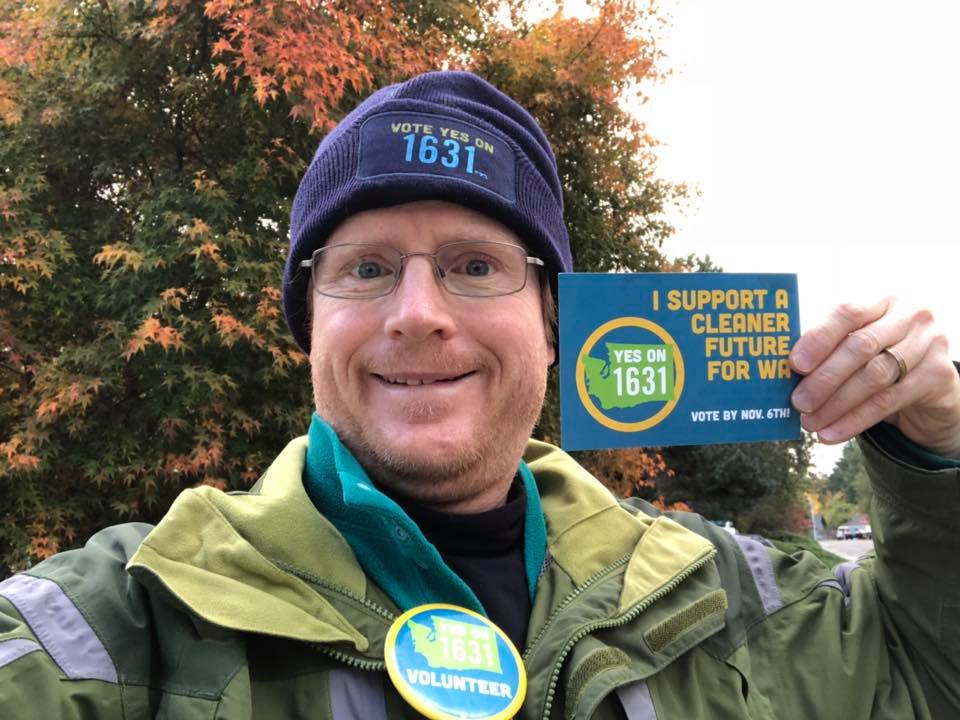
In the summer of 2018, I became involved with Renew Oregon’s efforts to urge Oregon Legislators to pass a cap and invest bill for Oregon, known then as the Clean Energy Jobs Bill. In the fall, Renew Oregon asked volunteers like me to go door to door canvassing in the Portland area to urge voters to elect Democratic incumbent Kate Brown for Governor and Democratic legislators so we could pass this bill in 2018.
My only time I did not canvass was when I took a 12-day trip to Missouri in mid-October 2018 with my wife Tanya. This was a climate change speaking tour where I gave talks at my alma mater William Jewell College, the University of Missouri in Columbia MO, St. Louis University, St. Louis Community College, and Oakville High School, where I graduated in 1987.
Overall, the Democratic Party did well in the 2018 election flipping the U.S. House of Representatives and electing a strong majority of Democrats to the Oregon Legislature as well as electing Kate Brown to a full term as Governor. The bad news was that the Washington ballot measure 1631 failed to pass. The 2018 election showed that many voters in the U.S. and Oregon were not happy with Donald Trump and the Trumpism movement. I was glad to have actively participated in that election with door-to-door canvassing in Oregon and Washington state.
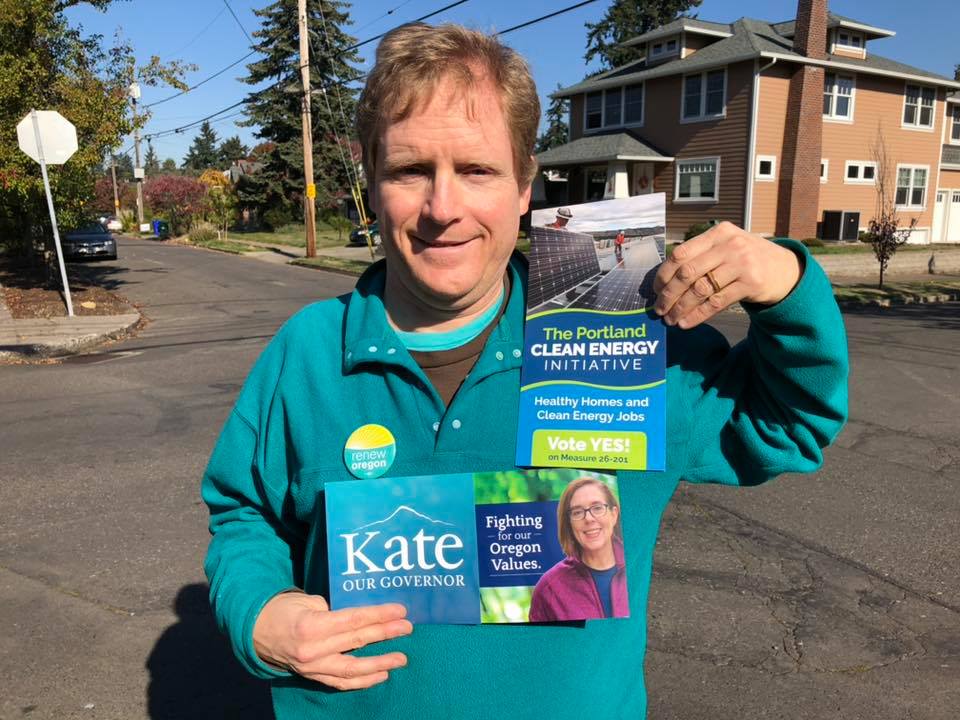
Organizing for Oregon’s Cap and Invest Bill in 2019 & 2020, then came COVID 19 pandemic
After the 2018 midterm election, Oregon voters seemed to give Governor Kate Brown and the Democratic controlled Legislature a mandate to pass Renew Oregon’s Clean Energy Jobs Bill to tackle climate change on the state level. In the remaining weeks of 2018, all of 2019, and in the first two months of 2020, I organized hard with Renew Oregon to encourage Legislators to pass the Clean Energy Jobs Bill. I regularly met and wrote letters to my state legislators, I attended town halls for my legislators and other nearby Oregon legislators, attended hearings before Joint Legislative Carbon Reduction committee that held hearings on the bill and testified numerous times before the committee, and I participated in Renew Oregon’s Lobby Days and rallies at the Oregon state Capitol.
All of this was not enough because a Republican Senate walkout prevented the Clean Energy Jobs bill from passing in June 2019. After all my efforts, that loss felt like a severe blow, similar to the Presidential election losses of 2000 and 2016. After several weeks feeling depressed and laying on the couch in July 2019, I picked myself back up and started organizing with Renew Oregon again. I organized two large community events attended by over 100 people in September 2019 and January 2020. For the short Oregon Legislative session of 2020, I repeated all the same actions I mentioned in the previous paragraph of regularly writing and meeting with my legislators, attending legislative town halls, attending legislative hearings and testifying, and participating in Renew Oregon’s Lobby Days and at the Oregon State Capitol in Salem.
The same result happened at the end of February 2020, the House and Senate Republican legislators walked out to prevent the Democratic legislators from passing the bills. This was another emotional letdown for me. Whenever I faced a defeat, disappointment, or setback in the climate movement, I always found a way to dust myself off and jump on a new horse. I would just focus on a new climate organizing project. However, in March 2020, the COVID pandemic arrived, and all my climate organizing came to a standstill.
I literally did not know what to do with myself. Suddenly, I had no climate meetings scheduled, no lobby meetings or legislative hearings to attend in Salem, no public presentations to give, no meetings or events to organize, etc. Nothing. All I could do was to sit at home. Thankfully, my wife had a good paying job, so financially we were better off that many people during the 2020 COVID 19 pandemic. However, with the bitter defeat of Oregon’s cap and invest bills and no climate activities to devote my attention, I fell into a severe depression.
Making the pandemic worse for me was the leadership of President Donald Trump. I craved for a leader like Winston Churchill who would rally us to say, ‘This will take a couple of years. It will require great sacrifice for all of us, but we will get through this and prevail.’ Instead, we had a President who downplayed the virus, thought it would magically disappear by late spring or summer, did not want to test the American public, and advised people to ingest bleach to defeat the disease. It was such a heavy and bleak time to be alive.
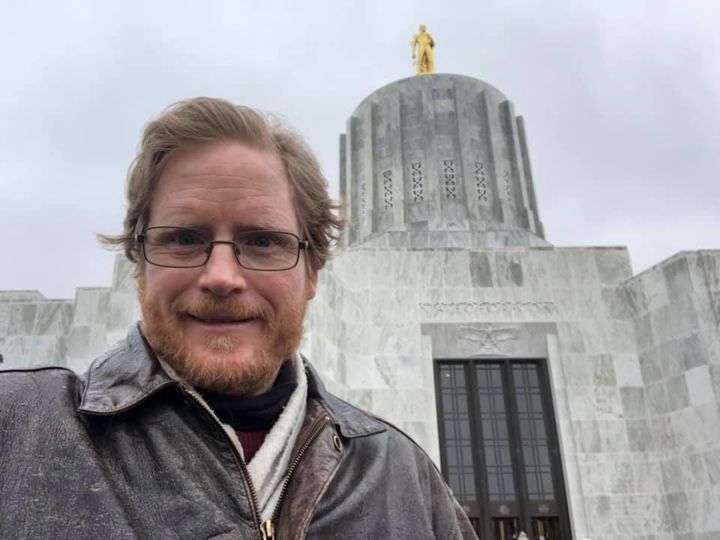
Stay tuned for Part 7 of this blog series, Working as a U.S. Census Enumerator and the Presidential Election of 2020.
